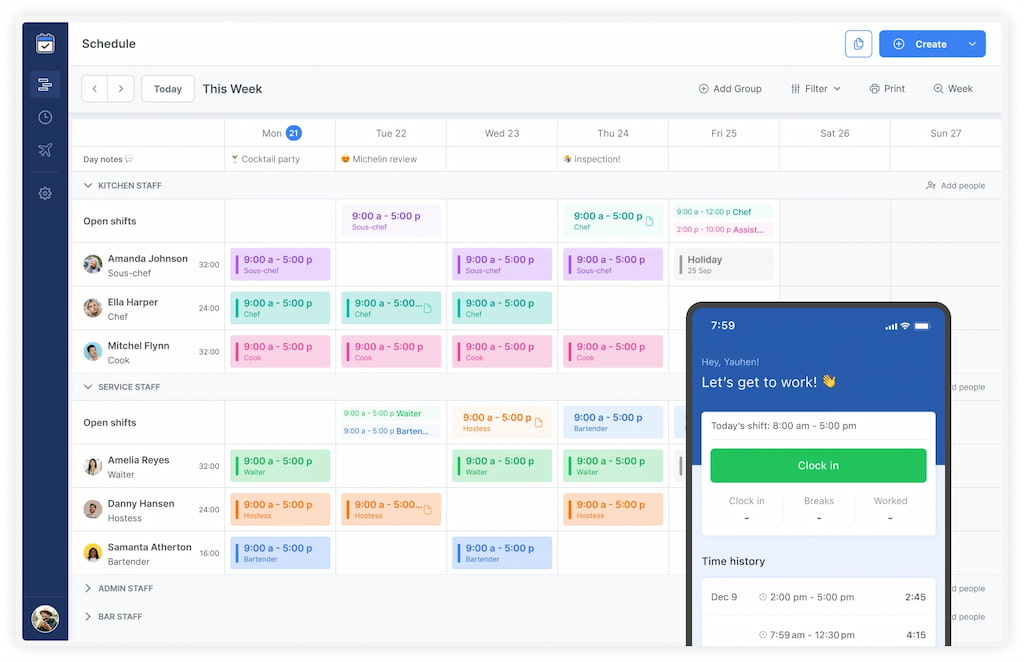Free employee shift scheduling apps can streamline the shift bidding process, an employee-centric approach that empowers workers to actively participate in selecting their work shifts. Rather than adhering to traditional top-down scheduling methods, it allows employees to bid for available shifts based on their preferences and availability.
🔎 How Does Shift Bidding Work?
Shift bidding is a flexible way to schedule work. Instead of managers assigning shifts, employees choose the ones they want. It gives workers more control and input in their schedules.

Here’s how it works:
- Managers release a pool of available shifts.
- Employees place bids based on availability, skills, or preferences.
- Managers evaluate bids using predefined criteria such as seniority, qualifications, or bid time.
- Shifts are assigned accordingly and published as the final schedule.
🤔 Who Can Use Shift Bidding?
- 🛒 Retail: Lets employees cover shifts based on changing customer demand.
- 🛎️ Hospitality & Restaurants: Helps front-line staff manage busy times like weekends or holidays. (Learn more about hospitality staff scheduling)
- 💉 Healthcare: Nurses and clinicians can choose night or weekend shifts based on skill and preference.
- 👩💻 Call centers: Matches shifts with agent availability to boost attendance and morale. (Might also reduce costs by lowering turnover)
- 🏭 Manufacturing: Makes rotating shifts more flexible by giving workers scheduling control.
- 🏫 Education: Helps non-teaching staff like custodians and admin maintain work-life balance.
👩 Advantages of Shift Bidding for Employees
Shift bidding boosts job satisfaction and gives employees more control over their time.
✅ Increased flexibility
Employees can select shifts that suit their life—ideal for parents, students, or those with part-time gigs.
✅ Higher engagement
Being part of the scheduling process gives employees a sense of ownership and commitment.
✅ Skill alignment & growth
Employees can bid for shifts that align with their strengths or areas they want to develop.
💼 Advantages of Shift Bidding for Employers
😊 Improved retention
Flexible scheduling reduces burnout, turnover, and absenteeism. Employees feel heard, and they stay longer.
📊 Optimal shift coverage
Fill critical shifts with qualified, willing team members instead of scrambling for coverage last-minute.
📈 Increased productivity
Workers who choose their shifts are generally more productive and cooperative.
💵 Reduced overtime costs
When shift preferences align with availability, it minimizes excess hours and associated costs.
⚖️ Scheduling fairness & compliance
Structured bidding helps maintain transparency and meets labor laws more easily.
❌ Possible Drawbacks of Shift Bidding
⚔️ Competition among staff
Popular shifts can create rivalries. Managers should use transparent selection criteria like first-come-first-served, seniority, or skills-based scoring.

👥 Reduced team interaction
Random shift patterns can make it hard for team members to work together. Managers can create shared shifts to help build stronger connections.
🧩 Scheduling constraints
Business demands don’t always match employee preferences. Managers must balance operational needs with flexibility.
🤝 Favoritism and bias
In open bidding, some workers might get better shifts because of personal ties with managers. This can feel unfair and hurt team morale.
🎓 Training and skill requirements
Shift bidding can mix employees with different skill levels. Employers should offer training and support to keep work running smoothly.
❓ FAQs About Shift Bidding
What is shift bidding?
It’s a scheduling process where employees bid on shifts based on their preferences.
Is shift bidding fair?
Yes, when managed transparently using clear rules like seniority, skills, or bid time.
Does shift bidding work for healthcare?
Absolutely. Hospitals and clinics benefit from empowering staff to choose preferred hours.
How can I automate shift bidding?
Tools like Shifts by Everhour let you automate bidding, resolve conflicts, and publish schedules in minutes.
What if no one bids on a shift?
Managers can manually assign unfilled shifts or offer incentives to attract bids.
Can employees swap shifts after bidding?
Yes, with manager approval. Most platforms support shift swaps post-assignment.
🔚 Final Thoughts
Shift bidding is a modern and flexible way to schedule work. It gives employees more control and helps employers build stronger teams with less hassle. Success comes from using the right tools, clear rules, and regular communication.
If you want to make scheduling easier and give your team more freedom, Shifts by Everhour is a great option. It handles everything from bidding to real-time updates—no spreadsheets, no confusion.
Find out how to reduce no-shows with real-time shift updates →

